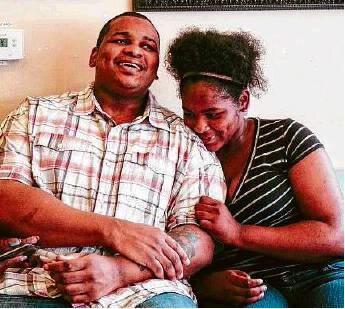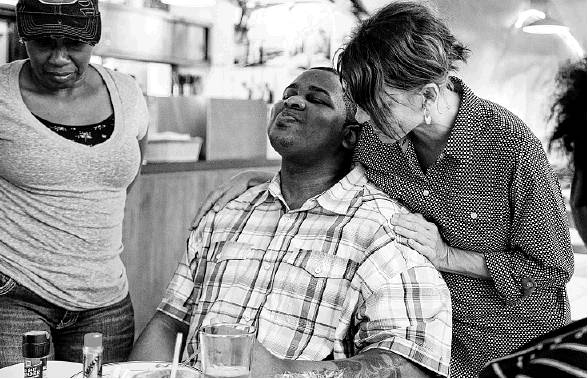Brown found ‘actually innocent’ in killing
Ex-prosecutor, police union slam special counsel’s scathing report
By Keri Blakinger STAFF WRITER
More than 15 years after the murder of a south Houston police officer landed him on death row, the final report is in: Alfred Dewayne Brown is actually innocent.
The news came Friday as part of a sweeping review authored by special prosecutor John Raley, who started investigating the Brown case last year at the behest of Harris County District Attorney Kim Ogg.
“My obligation as an advocate is not to tell people what they want to hear but to tell them the truth,” Ogg told a scrum of reporters gathered on the ground floor of the district attorney’s office. “Alfred Brown was wrongfully convicted through prosecutorial misconduct.”
The explosive findings offer far more than a simple take on Brown’s guilt or innocence. The painstaking 179-page report — compiled over 10 months — also delves into alternate theories of the case, outlines possible other suspects, details more extensive problems with the grand jury than previously reported and raises questions about what embattled former prosecutor Dan Rizzo knew and when he knew it.
“It is impossible to examine the conviction of Alfred Dewayne Brown without confronting prosecutorial misconduct,” Raley wrote. “ADA Daniel Rizzo presided over a Grand Jury that abusively manipulated witnesses to supply evidence for a chosen narrative. He was provided notice of the existence and meaning of exculpatory evidence, failed to produce it to the defense and avoided it during trial. Further investigation of his conduct is warranted.”
The scathing report comes two months after the State Bar of Texas tossed a disciplinary complaint against the retired lawyer, apparently finding there wasn’t enough information at the time to determine he’d done anything wrong.
Almost as soon as the report was released, the police union and Rizzo’s attorney both pushed back, lobbing allegations of missed facts and political motivations.
“The Raley report is a great use of artistic license used to fit a predesigned narrative,” said Chris Tritico, who is representing the former prosecutor. “The Harris County District Attorney’s Office is climbing over Dan Rizzo’s back to free a cop killer because of a campaign promise.”
Hilde Clark — the widow of Houston police officer Charles Clark slain in the robbery — tearfully expressed her disappointment in the district attorney and lobbed new allegations.
“I know from day one there’s people very close to Alfred Brown that have been protecting him,” she said. “I know that witnesses have been threatened.”
Despite the naysayers, Friday was a jubilant day for Brown and his legal team.
“The consonant bell of justice rings loudly today and shares what Alfred Brown’s family, supporters and attorneys have known for over a decade — that he is actually innocent,” said Casey Kaplan, one of the lawyers who worked on Brown’s appeal. “It is a good day.”
Missing phone records
Two years after the double murder that started it all, Brown was sent to death row in 2005. A decade after that, he was set free when evidence not turned over at trial — phone records that seemed to confirm his alibi — finally surfaced after a police officer discovered the material in his home garage.
But even after he left death row and settled into a new post-prison life, his case turned into a political quagmire as police and prosecutors struggled with whether Brown was truly innocent of the crime. The lack of an “actual innocence” declaration made him ineligible for state compensation, a fact that pushed his lawyers to sue the district attorney and the county in the hope of finding a different way to get money for the years he wrongfully spent behind bars.
Last year, a federal judge put the lawsuit on hold to give Ogg’s special counsel a chance to figure out whether Brown really killed the police officer in the botched check-cashing store robbery.
In the theory of the case presented at trial, prosecutors said that Brown had executed the police officer while his co-defendant Elijah Joubert shot to death store clerk Alfredia Jones, who had just returned from maternity leave. Both men were sent to death row, while a third co-defendant — Dashan Glaspie — got a 30-year sentence in exchange for his testimony.
But Brown always said he was innocent and that he had been at his girlfriend’s apartment just after the murders. The proof, he said, was in a phone call he had made to his girlfriend at work that morning.
For years, officials claimed they had no records of that call. Then in 2013, police investigator Breck McDaniel uncovered the phone records in his garage — a discovery that paved the way for Brown’s release.
At first, prosecutors said the evidence had been inadvertently misplaced and not intentionally concealed. But last year, Ogg’s office recovered a2003 email showing that McDaniel had told Rizzo about the phone records well before the case went to trial.
Rizzo has, through his attorney, consistently maintained that he never read that email and never saw the phone records. But court records show that he signed a document attached to the email after making the one slight change suggested in the body of the message.
In his report, Raley raises questions about how the records went missing from the state’s file. The papers in McDaniel’s garage were only photocopies; the originals he personally filed at HPD, and a U.S. Marshal said he watched him do it. In theory, those records should have been copied and added to the district attorney’s file but somewhere in that process they disappeared.
Other convictions
While the report could help lay the Brown matter to rest, the special prosecutor’s findings could also throw legal entanglements into two other cases — those of Glaspie’s and Joubert’s. Though Glaspie negotiated a plea deal based on the claim that he was not a shooter, Raley’s report suggests that he was and that he killed the store clerk.
During Joubert’s trial, Glaspie admitted that it was his gun used in the store clerk’s slaying. And, the day after the murders, another witness allegedly heard Glaspie confess on the phone.
“She got out of line and I did what I had to do,” he allegedly said. Two other witnesses offered similar testimony about other times Glaspie allegedly confessed.
If Glaspie was one of the shooters, Raley wrote, then that means he lied to get a plea deal — a possibility that would call into question all of his testimony, including his identification of Brown as the third shooter.
“The state’s chief witness Dashan Glaspie murdered Alfredia Jones in cold blood, then avoided a murder charge by providing law enforcement with a name for Officer Clark’s killer,” Raley wrote. “There are numerous factual and logical flaws in his uncorroborated testimony against Brown. Multiple eyewitness sightings indicate that the third man was shorter than Brown.”
And, though last year — in an effort to get the lawsuit tossed out — the Harris County Attorney’s Office argued that the withheld landline records proved Brown’s guilt, Raley argues that they proved his innocence. Claiming that Brown “bluffed his way out of prison,” the county attorney alleged that the call in question was actually a three-way call and that Brown was not at his girlfriend’s but with Glaspie and Joubert. Raley dismissed that possibility, pointing out that a woman who saw Glaspie and Joubert’s end of the call has repeatedly stated that Brown was not there. She wasn’t even able to pick him out of a lineup.
“By clear and convincing evidence,” wrote Raley, with the Raley & Bowick firm in Houston, “no reasonable juror would fail to have a reasonable doubt about whether Brown is guilty of murder. Therefore his case meets the legal definition of ‘actual innocence.’ ”
It’s still not clear what role Joubert played in the crimes and, though the report offers some possibilities, it’s not clear who the third man was.
Looking ahead
Ogg said Friday that she would accept all of Raley’s findings and that her office filed an amended motion to dismiss Brown’s case, this time dubbing him “actually innocent.” If the judge agrees, that would pave the way for state compensation for the 12 years Brown spent behind bars.
But the report doesn’t immediately present a resolution to the ongoing lawsuit. Currently, the County Attorney’s Office is representing Ogg’s office in the matter, and if they do not concur with Raley’s findings then Ogg could be forced to find other legal counsel to work toward a resolution, she said.
As the courts work out the legal entanglements surrounding Brown, there’s also the question of what — if anything — happens to Rizzo. It’s yet not clear whether he committed any crimes, Ogg said, but prosecuting him could pose problems with statutes of limitations and conflicts of interest. She, like many of the lawyers who work for her, has known Rizzo for decades, so a judge may have to appoint outside attorneys to handle the case.
In the meantime, prosecutors plan to file another complaint with the State Bar, whose investigators Ogg pointed out “did not have the benefit of Mr. Raley’s report” when they evaluated the matter before.
There’s no plan to review Rizzo’s other cases, unless defendants raise claims on appeal. And it’s not clear whether the Houston Police Department will take the matter up again, though Ogg suggested they treat it as an “open investigation.”
“Police and prosecutors disagree every day,” she said. “We have different jobs.”
Despite Ogg’s strong stance, not everyone was convinced. As soon as the district attorney’s news conference ended, the Houston Police Officers’ Union convened its own media gathering.
Heated reactions
“I’m disgusted with Kim Ogg today,” former union president Ray Hunt said, calling her a “disgrace.” Current union head Joe Gamaldi urged authorities to take Brown’s case back to a grand jury, while vice president Doug Griffith called the district attorney’s office “a bunch of clowns.”
The union threatened to file bar grievances against either Ogg or Brown’s attorneys, saying “one of them is lying,” before invoking alleged connections to liberal investor George Soros.
But Brown and his attorneys were unfazed by the vehement pushback.
“Anyone who thinks Mr. Brown is guilty is wrong,” said Neal Manne, the high-profile Houston attorney who’s handled his quest for state compensation. At this point, Brown could be entitled to nearly $2 million in compensation, half in a lump sum and half in an annuity.
“Does that compensate someone for spending 12 years and 62 days in prison?” he said. “Of course it doesn’t.”
Brown, who now lives in Louisiana, is “remarkably not bitter,” Manne said. And Brian Stolarz, the lead attorney who got him off death row, expressed gratitude for the thorough review.
“We are heartened that he found what we have known all along: Dewayne Brown is actually innocent and was wrongfully convicted and imprisoned,” he said. “We commend the district attorney’s commitment to the truth and ensuring that miscarriages of justice like this never happen again in Harris County.” keri.blakinger@chron.com

